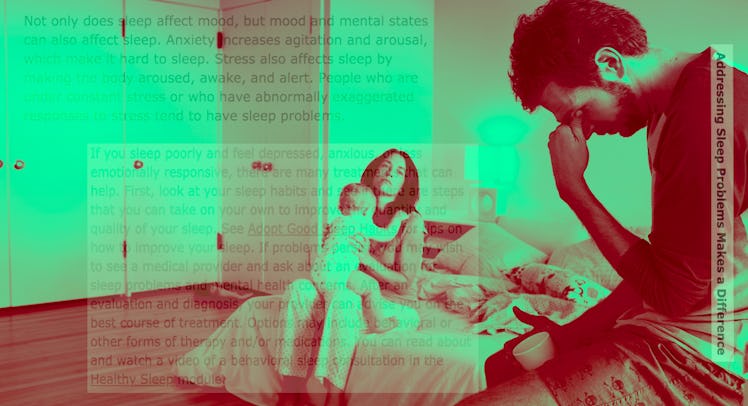How Much Sleep Can Dads Lose Before Things Get Ugly?
Sleep deprivation is a reality of parenthood, but you still need about six hours per night to stay healthy.

Sleep loss has indisputable, negative, and progressive effects on health, and yet new parents lose an estimated 20 hours of sleep per week—more than 1,000 hours in their first year. But how much shut-eye does a new dad need, at minimum, before lack of sleep begins to cause real damage?
Two or three consecutive nights of four hours of sleep is about as far as you can go without hurting yourself, according to New York-based surgeon Christopher Hollingsworth (himself, a father of a newborn). But he doesn’t suggest pushing the envelope, and stresses most adults will begin experiencing adverse health effects unless they get at least six hours of sleep per night.
“People start to have measurable changes in their bloodstream within about a week and a half” of sustained lack of sleep, Hollingsworth told Fatherly. A sleep-deprived dad can also expect higher levels of the stress hormone cortisol and inflammation. “There’s no amount of coffee in the world that can fix that.”
While you may have thought it could take years to toss and turn your way into what qualifies as long-term sleep deprivation, studies suggest that missing as little as two hours of sleep in one night could double your risk of car crash and increase your risk of work-site accidents by 70 percent. Those lucky enough to beat the odds will still have to deal with increased junk food cravings, and subsequent health problems from an unbalanced diet and potential weight gain. Likewise, there’s ample evidence that long-term exposure to cortisol and inflammation raises your risk for mood and memory problems, diabetes, high blood pressure, and male infertility. The signs may manifest after only a week and a half of sleep deprivation.
These adverse effects occur because our bodies respond to sleep deprivation in much the same way they respond to sickness or injury, Hollingsworth says. Incidentally, you can soften the blow from sleep deprivation by treating yourself like you have the flu. Hollingsworth suggests staying hydrated and maintaining a balanced diet, sort of like you’re sick or hospitalized.
Still, some people are fine on fewer than six hours of sleep. “Just because research shows that sleep-loss elevates inflammatory markers doesn’t mean everyone is going to react badly,” Hollingsworth says. “Some people probably compensate for that, especially people with really good habits” such as working out and eating right.
The most crucial thing for parents to understand about sleep deprivation is that they’re not condemned to a future of health problems just because they changed a midnight diaper. Inflammation and cortisol levels eventually go back to normal, and even though they may leave damage behind, there’s always more you can do to improve your habits and overall health. Lack of sleep is, perhaps unsurprisingly, not a death sentence. “No matter how bad it may seem, you can always make that better. There’s never going to be a point where that’s hopeless.”
This article was originally published on